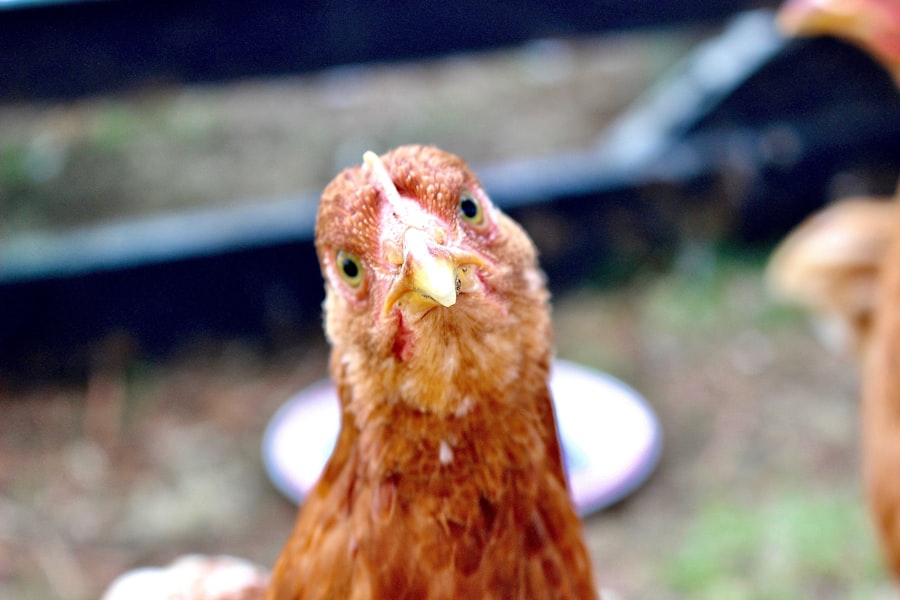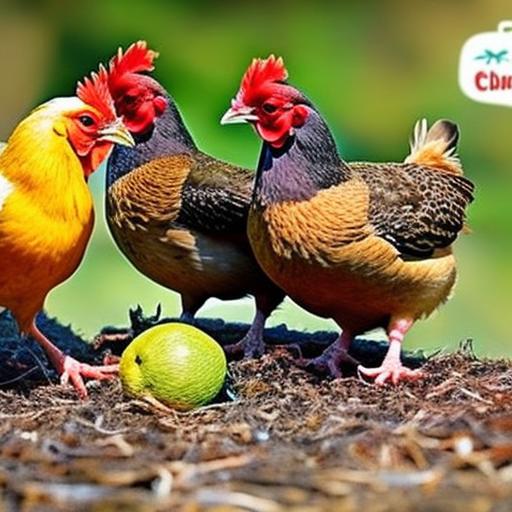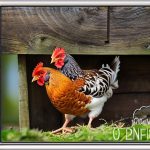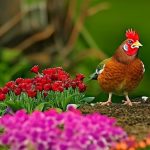Winter care is crucial for chickens as it ensures their health and comfort during the cold months. Chickens are susceptible to the harsh weather conditions, and without proper care, they can suffer from frostbite, respiratory issues, and other health problems. By taking the necessary steps to prepare their coop and provide them with the right conditions, you can ensure that your chickens stay healthy and happy throughout the winter.
Keeping chickens healthy and comfortable during winter is important for several reasons. Firstly, it helps to maintain their overall well-being. Just like humans, chickens need a warm and cozy environment to thrive. Cold temperatures can cause stress and weaken their immune system, making them more susceptible to diseases. Secondly, providing proper winter care ensures that your chickens continue to lay eggs consistently. Cold weather can disrupt their egg production, so it’s essential to create an environment that supports their natural egg-laying cycle.
Key Takeaways
- Winter chicken care requires proper preparation and attention to detail.
- Preparing the coop for winter involves cleaning, repairing, and adding insulation.
- Adequate ventilation is crucial for preventing moisture buildup and maintaining air quality.
- Choosing the right bedding material can help keep chickens warm and dry.
- Providing fresh, unfrozen water and a balanced diet is essential for keeping chickens healthy in winter.
Preparing the Coop for Winter
Before winter arrives, it’s crucial to clean the coop thoroughly. Remove any old bedding, droppings, and debris from the coop. Cleaning the coop not only helps to maintain good hygiene but also prevents the buildup of harmful bacteria and parasites that can affect your chickens’ health. Once the coop is clean, inspect it for any damage or leaks. Repair any cracks or holes in the walls or roof to prevent drafts and moisture from entering the coop.
Insulating the Coop
Insulating the coop is essential for maintaining a warm and energy-efficient environment for your chickens. There are various insulation materials you can use, such as straw bales, foam boards, or reflective insulation. When insulating the coop, focus on the walls, ceiling, and floor. Ensure that there are no gaps or openings where cold air can seep in.
Proper insulation is crucial because it helps to retain heat inside the coop and prevents drafts. It also helps to regulate the temperature, keeping it warm during the cold nights and cooler during the day. Insulation also plays a significant role in energy efficiency, as it reduces the amount of heat that escapes from the coop. This can help to lower heating costs and keep your chickens comfortable throughout the winter.
Providing Adequate Ventilation
While insulation is important for warmth, proper ventilation is equally crucial for maintaining good air quality inside the coop. Ventilation helps to remove excess moisture, ammonia, and odors that can build up in a confined space. It also prevents the buildup of harmful gases, such as carbon dioxide, which can be detrimental to your chickens’ health.
To provide proper ventilation without causing drafts, it’s essential to have a well-designed ventilation system in place. This can include vents or windows that can be opened or closed as needed. Position the vents or windows in a way that allows for good air circulation without exposing your chickens to direct drafts. It’s important to strike a balance between providing fresh air and maintaining a warm environment.
Regularly check the ventilation system to ensure that it’s functioning properly. Remove any obstructions or blockages that may hinder airflow. Additionally, monitor the humidity levels inside the coop and adjust ventilation accordingly. High humidity can lead to condensation and moisture buildup, which can be harmful to your chickens’ health.
Choosing the Right Bedding Material
Choosing the right bedding material is crucial for providing comfort and insulation for your chickens during winter. There are several options available, including straw, wood shavings, pine needles, or shredded paper. Each type of bedding material has its pros and cons.
Straw is a popular choice as it provides good insulation and absorbs moisture well. However, it can become compacted over time and may need frequent replacement. Wood shavings are another common option as they provide good insulation and are easy to clean. Pine needles are a natural option that provides good insulation and has antimicrobial properties. Shredded paper is a cost-effective option that provides insulation but may not absorb moisture as well as other materials.
When choosing the best bedding material for your chickens, consider factors such as availability, cost, and ease of cleaning. It’s important to regularly clean and replace the bedding to maintain good hygiene and prevent the buildup of harmful bacteria.
Watering System in Winter

Providing fresh water is crucial for your chickens’ health during winter. However, water freezing can be a common problem. It’s important to take steps to prevent water from freezing and ensure that your chickens have access to clean water at all times.
One way to prevent water from freezing is by using heated waterers. These are specially designed waterers that have built-in heaters to keep the water from freezing. Another option is to use insulated waterers, which help to slow down the freezing process. Insulating the waterers with foam or straw can also help to keep the water from freezing for longer periods.
It’s important to regularly check the waterers and remove any ice or snow that may accumulate on top. This will ensure that your chickens have access to fresh water throughout the day. Additionally, consider placing the waterers in a sheltered area or using heated bases to prevent freezing.
Feeding Your Chickens in Winter
During winter, chickens have different dietary needs compared to other seasons. They require more energy to stay warm, so it’s important to provide them with a balanced diet that meets their nutritional requirements.
Consider increasing their protein intake during winter by providing high-quality feed or supplementing their diet with protein-rich treats such as mealworms or black soldier fly larvae. Protein helps to keep them warm and supports their overall health.
It’s also important to ensure that their feed is fresh and doesn’t spoil. Store the feed in a cool, dry place and check for any signs of mold or pests. Avoid overfeeding your chickens, as this can lead to obesity and other health issues. Instead, provide them with small, frequent meals throughout the day.
Maintaining Proper Lighting
Proper lighting is important for maintaining egg production during winter. Chickens require a certain amount of light each day to stimulate their reproductive system and lay eggs consistently. During winter, when daylight hours are shorter, it’s important to provide supplemental lighting to ensure that your chickens receive enough light.
Use a timer to provide 14-16 hours of light each day. This can be achieved by using artificial lighting in the coop or extending their natural daylight hours with supplemental lighting. Position the lights in a way that mimics natural daylight and avoid placing them too close to the chickens to prevent stress.
It’s important to maintain a healthy circadian rhythm for your chickens by providing consistent lighting. Sudden changes in lighting can disrupt their sleep patterns and overall well-being. Gradually adjust the lighting schedule over a period of time to minimize stress.
Protecting Your Chickens from Predators
Predators can pose a threat to your chickens during winter months when food sources are scarce. Common predators include raccoons, foxes, owls, and rats. It’s important to take steps to protect your chickens and ensure their safety.
Inspect the coop regularly for any openings or weak spots that predators can exploit. Repair any damage or reinforce weak areas with sturdy materials such as hardware cloth or wire mesh. Install predator-proof locks on doors and windows to prevent unauthorized access.
Consider installing motion-activated lights or alarms around the coop to deter predators. These can help to scare away potential threats and alert you to any suspicious activity.
Keeping Your Chickens Healthy in Winter
Winter can bring about various health issues for chickens, so it’s important to take steps to prevent and treat common illnesses.
One common health issue during winter is respiratory problems. Cold temperatures and poor ventilation can lead to respiratory infections. Ensure that the coop is well-ventilated and free from drafts. Provide your chickens with a clean and dry environment to minimize the risk of respiratory issues.
Another common issue is frostbite, which can affect chickens’ combs, wattles, and feet. Insulate the coop properly and provide extra bedding to keep them warm. Consider applying petroleum jelly or a similar protective ointment on their combs and wattles to prevent frostbite.
Maintaining good overall health during winter is crucial. Provide your chickens with a balanced diet, clean water, and regular exercise. Monitor their behavior and appearance for any signs of illness, such as lethargy, loss of appetite, or abnormal droppings. Consult a veterinarian if you notice any concerning symptoms.
Winter care for chickens is essential for their health and well-being. By taking the necessary steps to prepare the coop, provide proper insulation and ventilation, choose the right bedding material, ensure access to fresh water, feed them a balanced diet, maintain proper lighting, protect them from predators, and monitor their health, you can ensure that your chickens stay happy and healthy throughout the winter months.
Remember to regularly clean the coop, inspect for any damage or leaks, and make necessary repairs. Proper insulation helps to maintain a warm and energy-efficient environment, while adequate ventilation ensures good air quality without causing drafts. Choose the right bedding material that provides comfort and insulation for your chickens.
Provide fresh water by using heated or insulated waterers to prevent freezing. Adjust their diet to meet their increased energy needs during winter. Maintain proper lighting to support egg production. Protect your chickens from predators by securing the coop and installing deterrents.
Lastly, monitor your chickens’ health closely and take prompt action if you notice any signs of illness. By prioritizing winter care for your chickens, you can ensure that they stay happy, healthy, and productive throughout the winter months.
If you’re looking for tips on how to keep chickens warm and comfortable during the winter months, you might find this article on how to insulate a chicken coop from Poultry Wizard helpful. Insulating your coop can make a significant difference in maintaining a cozy environment for your feathered friends. From choosing the right materials to understanding proper ventilation, this article covers everything you need to know to ensure your chickens stay happy and healthy throughout the colder season. Check it out here.
FAQs
What is the best way to keep chickens warm in winter?
The best way to keep chickens warm in winter is to insulate their coop and provide them with a heat source such as a heat lamp or a heated waterer.
What should I feed my chickens in winter?
In winter, chickens need more protein and fat to keep warm. You can feed them high-protein foods such as mealworms, sunflower seeds, and black oil sunflower seeds.
How often should I clean my chicken coop in winter?
You should clean your chicken coop at least once a week in winter to prevent the buildup of moisture and bacteria. Use dry bedding such as straw or wood shavings to absorb moisture.
Can chickens get frostbite?
Yes, chickens can get frostbite on their combs, wattles, and feet in extreme cold temperatures. To prevent frostbite, make sure their coop is well-insulated and provide them with a heat source.
Do chickens need sunlight in winter?
Yes, chickens need sunlight in winter to maintain their health and egg production. Make sure their coop has windows or a skylight to let in natural light.
How do I prevent my chickens’ water from freezing in winter?
You can prevent your chickens’ water from freezing by using a heated waterer or by changing their water frequently throughout the day. You can also add a small amount of apple cider vinegar to their water to prevent it from freezing.
Meet Walter, the feathered-friend fanatic of Florida! Nestled in the sunshine state, Walter struts through life with his feathered companions, clucking his way to happiness. With a coop that’s fancier than a five-star hotel, he’s the Don Juan of the chicken world. When he’s not teaching his hens to do the cha-cha, you’ll find him in a heated debate with his prized rooster, Sir Clucks-a-Lot. Walter’s poultry passion is no yolk; he’s the sunny-side-up guy you never knew you needed in your flock of friends!







